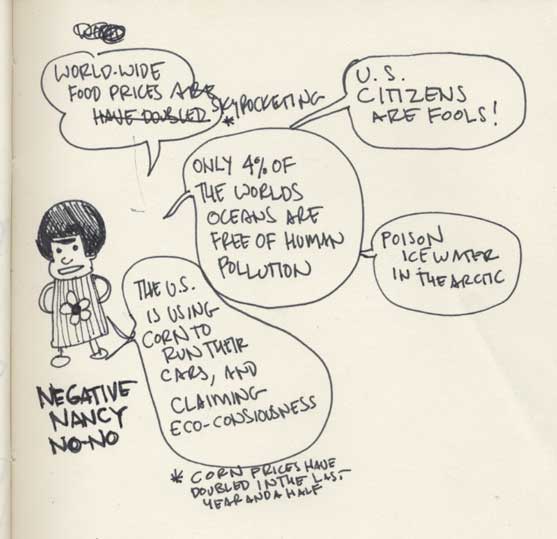I like being good. And usually I am good at obeying rules. I am a law abiding citizen, and a girl that never once wagged or got a late mark in six years of senior school. But in the last three days there have been three separate reminders that some rules need to be broken. That if we always work within the boundaries then nothing is going to change. Nothing evolves or innovates. And we would all live in a monotone and static world.
So here are my three timely reminders of how and why we should do the impossible:
1. On Tuesday comedian Daniel Kitson reminded me that pushing past the impossible is entirely possible.
I like life lessons, but I love them, when they arrive with laughter. Daniel Kitson was awesome. An intelligent, funny man with an amazing vocabulary. His whole show, Where Once Was Wonder, is about how we need to let go of our comfortable ways of wisdom and achieve things that others say are impossible. Before they happen it almost hurts our brain to think about it, but once it is here we can’t imagine how we lived without it. All the best innovations are like that – planes, tv’s, iPhones, those fake gas fireplaces. We need people who break stereotypes, say completely inappropriate things, mix sweet and savoury and remind us that if you keep trying different things you will push past the impossible. And there is exciting, and funny, stuff on the other side of the impossible door.
2. Yesterday, optimist Mark Stevenson, reminded me that cynicism is not cool.
He calls himself an optimist. Mark Stevenson looks at everything, sees the positive and thinks ‘what’s next’. He looks at a process and wonders how we could do it better. I think that is a good thing. And I think that I have a lot of that in me too. When it rains we get wet, but the plants get watered. When we run out of milk, we try juice on muesli. Some people find it frustrating. But I like that it makes us try something different. That it keeps the innovation ball rolling and that I might accidentally discover something really great. I am often asked, why am I always so optimistic. I am not sure. My Mum is like that too, so maybe it’s genetic? But instead of defining yourself by who you are be what you create.
Mark also proposed that today optimism is seen as naivety and that for some reason it is cool to be cynical. To be the one that always say no. That it is not possible.
Cynicism is like smoking. It might look cool but it is bad for you. And even worse for the person next to you. Cynicism is the ultimate enemy of creativity.
Breaking rules allows for innovation. Don’t look at boundaries as limitations but as opportunities.

3. Today Yammer made Microsoft Office Social
If some body had asked me last year, would it be possible for numerous people all around the world to work on the same word, excel, or powerpoint document at the same and be able to see each others real time changes, then upload it to an enterprise social network where all their colleagues could simultaneously view, edit or download it…. the underfed cynic in me would have said, ‘no. BUT that would be amazing.’ And now it will be possible. Pretty damn cool. Yammer has made Microsoft Office social.
So the impossible is entirely possible and to do it we need to break the rules.
I had three great reminders of that this week. One from comedy. One from an optimist. And one from work.
Some rules and ways of traditional wisdom need to broken. And when they do the world changes. We just need to make sure the right people are creating the new value systems. So put your hand up and say it is possible. Let’s give the cynics the flick and make the impossible happen.



